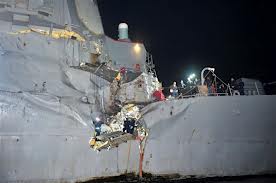 Last week a U.S. Navy ship collided with a Japanese oil tanker in the Persian Gulf. This could have been a tragedy or become an international incident. It did not. My first reaction was a concerned “Oh, wow,” but within seconds, I was chuckling, “How does the person in charge explain that?” Granted, it happened at night. But there were people charged with knowing what was in the water and sky for miles around. There were systems, and back-up systems, and back-ups to the back-ups constantly scouring the sky and sea.
Last week a U.S. Navy ship collided with a Japanese oil tanker in the Persian Gulf. This could have been a tragedy or become an international incident. It did not. My first reaction was a concerned “Oh, wow,” but within seconds, I was chuckling, “How does the person in charge explain that?” Granted, it happened at night. But there were people charged with knowing what was in the water and sky for miles around. There were systems, and back-up systems, and back-ups to the back-ups constantly scouring the sky and sea.
You can’t really say, “He came out of nowhere!” This was not a Camaro. It was a tanker the length of a football field. It had its own people and systems and back-up systems, too. And yet the two ships collided. The embarrassed brass is questioning, “How did such a thing happen? Did systems fail? Even if systems failed, who failed to take appropriate action?”
 This incident is a stunning metaphor for what has been happening in our country the past few years or even decades. We have had tanker-sized realities steaming toward us for years, alarms have been sounding, we have some gaping holes in the bow, and yet we look around and say, “We didn’t see this coming!”
This incident is a stunning metaphor for what has been happening in our country the past few years or even decades. We have had tanker-sized realities steaming toward us for years, alarms have been sounding, we have some gaping holes in the bow, and yet we look around and say, “We didn’t see this coming!”
What are some of the avoidable collisions? Pick any recent crisis or political volleyball being spiked back and forth. The bursting of the housing bubble, the banking crisis and recession, the bulging national debt and national waistline, a decaying infrastructure and outdated electrical grid, the acceleration of climate change, escalating health care costs, concerns about the future solvency of Social Security and Medicare, rising domestic terrorism, our educational system that gets wound tighter and tighter and keeps falling further behind, just to name a few. None of these suddenly appeared out of nowhere. These have been steadily closing the gap between “might happen” and “we’re taking on water!”
 The only surprise is that with numerous congressional hearings, studies, investigations, and all manner of information gathering, we and our leaders are still surprised. We scratch our heads and say, “We didn’t see this coming!” We seem more obsessed with identifying who left the gate open than with closing the gate while closing it would do some good.
The only surprise is that with numerous congressional hearings, studies, investigations, and all manner of information gathering, we and our leaders are still surprised. We scratch our heads and say, “We didn’t see this coming!” We seem more obsessed with identifying who left the gate open than with closing the gate while closing it would do some good.
And yet, in most cases, these issues were not only predictable and therefore avoidable, they were predicted. Signals and lights have been going off, people have been sounding the warnings, and yet we and our leaders have ignored them. Now, what were once inconveniences have become imminent, and in some cases, we’ve already sustained damage.
Steven Covey described a useful schema for managing time and tasks. First, consider the importance of a task, high or low. Next consider the immediacy of the task, high or low. High immediacy means, do it now. Low immediacy means it can be addressed later. He proposed that the most effective leaders, and those who were most effective in life tasks in general were those who spent more of their time and energy focused on the tasks that were of high importance and low immediacy. That is, focus more on those things that are of great importance, but take care of them before they become a crisis.
So here we are on the ship. The officers cluster in small groups on deck, talking only to those in their own group.
“It’s been coming at us for a long time. A collision seems imminent, but we don’t think it would actually hit us.”
“Let it hit. This is a U.S. ship. We can’t be sunk.”
“We can’t take evasive action. That would look cowardly.”
“Let it hit on their watch. Then we can blame them and assume leadership.”
As the crew, we need to recognize that these issues are neither simple nor quick to fix. We need to identify and elect leaders who won’t wait for the crisis, who will recognize these issues as complex, requiring our best cooperative and sacrificial efforts, who will sound the alarm rather than disarm it, and who will work with all hands on deck to steer clear of further damage.
Otherwise we’ll continue to duct tape the bow and complain, “Someone should have warned us.”
0 Comments until now
Add your Comment!